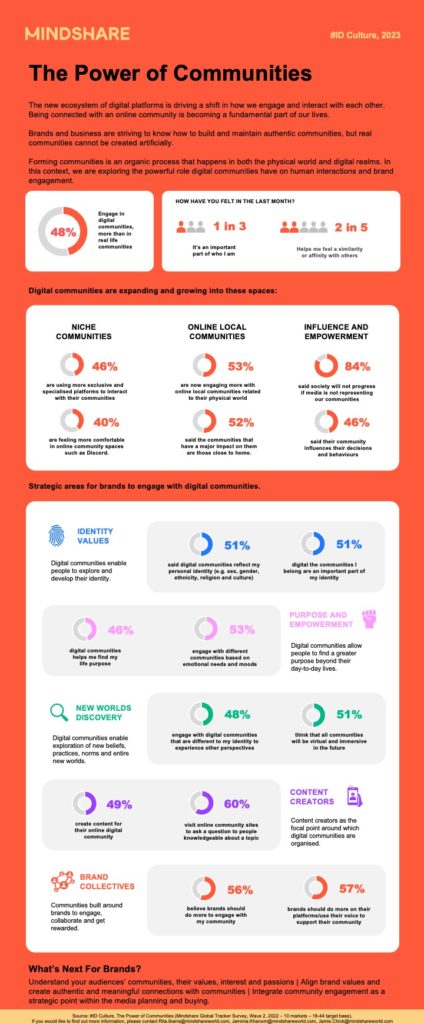6th April 2023
Mindshare #ID Culture: The Power of Communities
Our latest #ID Culture report, The Power of Communities, explores the powerful role digital communities have on human interactions and brand engagement.
The new ecosystem of digital platforms is driving a shift in how we engage and interact with each other. Being connected with an online community is becoming a fundamental part of many people’s lives.
Community is an age-old concept that binds us together based on our shared values, interests, and culture. After a period when we were more isolated and disconnected and spent more time online than ever before, we are experiencing a resurgence of community. We are moving from a society with an individuality mindset to a more collective one, where people are sharing and collaborating with more empathy.
Brands and business are eager to know how to build and maintain authentic communities. But real communities cannot be created artificially, it's an organic process that comes about in both the physical world and digital realms. Mindshare research found that 48% of 18- to 44-year-old global respondents engage in digital communities, more than in real life communities. In this context, we’re exploring the powerful role digital communities have on human interactions and brand engagement.
Growth of mainstream and niche communities.
Digital community engagements – in both mainstream and niche platforms – are increasing worldwide, as social media usage growth continues (globally, the number increased from 2019 to 2022 by more than one billion - We Are Social, 2022). 46% of people are using more exclusive and specialised platforms to interact with their communities, and 40% are feeling more comfortable in online community spaces such as Discord.
Digital local communities on the rise.
Digital communities are bringing people together on both a local and global level – 48% of people said they are engaging more with global digital communities. We are also seeing physical communities decreasing, giving way to the rise of online local engagement, with 53% of people saying they are now engaging more with online local communities related to their physical world, and 52% said the communities that have a major impact on them are those close to home.
Communities drive influence and empowerment.
Communities empower people to create change, and this is having an impact on people’s expectations from brands with 84% saying society will not progress if media is not representing our communities. Online communities are important for people’s self and and social identity, and sense of belonging. 1 in 3 said it is an important part of who they are, and 2 in 5 said that it helps them feel a similarity or affinity with others. More than ever, brands have a bigger role to play in community engagement: 66% believe all brands should have a purpose, and 66% say these days they are buying from brands they know and trust. Community engagement has the power to influence and drive decision making – almost half (46%) of our global respondents say their community influences their decisions and behaviours.
Key strategic areas for brands to engage with digital communities
Communities are foundational for our world to thrive and evolve, presenting brands with the opportunity to engage with these communities in meaningful ways. Our #ID Culture - The Power of Communities report identified 5 key facets of digital communities, what is important for them and how brands can connect with these communities:
1. Identity:
Digital communities empower people to explore and develop their identity – 51% say their digital communities reflect their personal identity (e.g. sex, gender, ethnicity, religion and culture) and 51% also say the digital communities they belong to are an important part of their identity..
2. Purpose:
Digital communities allow people to find a greater purpose beyond their day-to-day – 46% say digital communities helps them find their life purpose and 53% engage with different communities based on emotional needs and moods.
3. Discovery:
Digital communities enable the exploration of new beliefs, practices, and norms – 48% engage with digital communities that are different to their identity to experience other perspectives and 51% think that in the future, all communities will be virtual and immersive.
4. Creators:
Content creators are the focal point around which digital communities are organised – 49% create content for their online digital community and 60% visit online community sites to ask a question to people knowledgeable about a topic.
5. Brand Collectives:
Communities built around brands to engage and collaborate can provide value exchange for both brands and consumers. 56% believe that brands should do more to engage with my community, and 57% say brands should do more on their platforms/use their voice to support their community.

Brands need to understand the communities their audiences are involved with, and they should authentically engage with the communities that are relevant to their brand values. Brands should also consider integrating communities as a strategic point within their media planning and buying. Most of the digital population are now a part of social media platforms and connecting with communities at some level, so identifying their interests and values is key for meaningful consumer engagement.